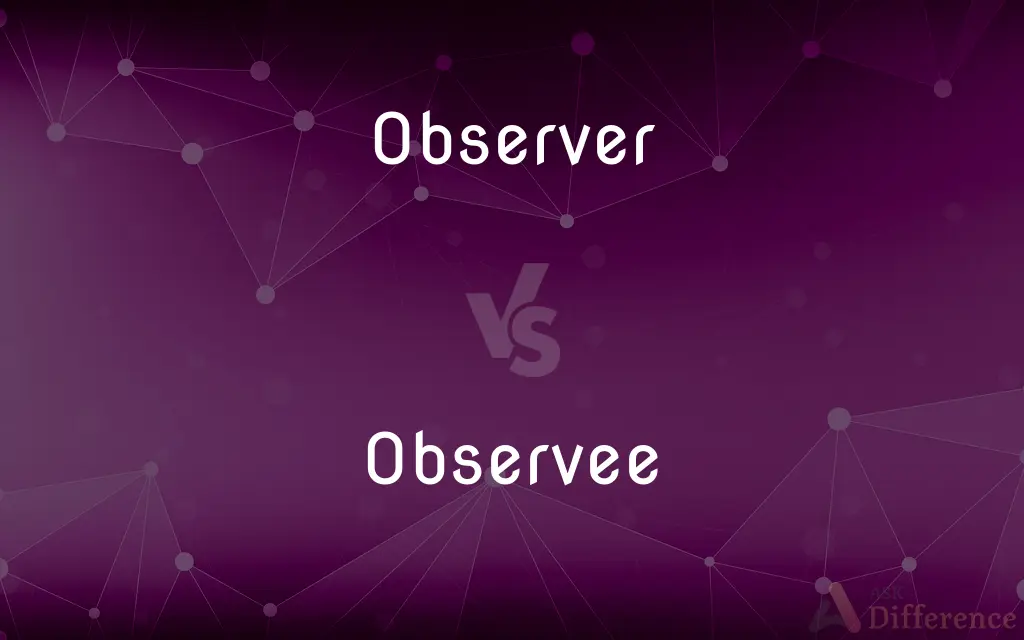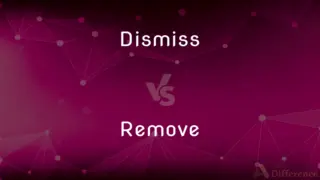Observer vs. Observee — What's the Difference?
Edited by Tayyaba Rehman — By Maham Liaqat — Updated on April 27, 2024
Observer refers to the one who watches or notices something; observee is the entity or person being watched or observed.

Difference Between Observer and Observee
Table of Contents
ADVERTISEMENT
Key Differences
An observer is an individual or a device that actively watches, monitors, or records events, behaviors, or phenomena. In contrast, an observee is the subject or object that is being observed. This dynamic is common in settings like research, surveillance, or educational assessments.
Observers often have a specific purpose or objective behind their observation, such as gathering data, supervising, or learning. On the other hand, observees may be unaware of being observed or might actively participate in the process, depending on the context such as in a classroom or a psychological study.
The role of the observer is typically passive in terms of interaction with the observee, focusing instead on accurate and unbiased data collection. Whereas, the observee might interact with the environment or other subjects, providing the data or behaviors that are being recorded.
Observers must maintain a certain degree of detachment to ensure objectivity and reliability of their observations. Meanwhile, observees are often simply engaged in their natural behaviors or in tasks specifically designed for them, without the responsibility of maintaining observational integrity.
The skills required for an effective observer include attention to detail, impartiality, and sometimes note-taking or technical skills for recording. Conversely, the observee does not require these skills but rather is the focus of the observer’s skills and tools to capture their actions or responses.
ADVERTISEMENT
Comparison Chart
Role
Watches or monitors
Is watched or monitored
Interaction
Passive, minimal interaction
Active, central to the observation
Objective
To gather data, supervise, or learn
To provide data or perform activities
Skills Required
Attention to detail, impartiality
None specific to being observed
Awareness
Highly aware and focused
May or may not be aware of observation
Compare with Definitions
Observer
A researcher conducting observational studies.
The observer carefully recorded the behaviors of the study participants.
Observee
A person who is being watched or studied.
The observee was unaware of the ongoing surveillance.
Observer
Someone present but not participating directly.
As an observer in the meeting, she took no part in the discussion.
Observee
An animal or group of animals under observation.
The observees, a group of chimpanzees, were part of a long-term behavioral study.
Observer
A neutral party present to ensure fairness or transparency.
International observers were invited to monitor the election.
Observee
The subject or focus in an experiment.
The chemical reactions became the primary observees in the lab tests.
Observer
A device or tool used to monitor or record.
The telescope, a powerful observer of distant galaxies, provided new data.
Observee
A participant in educational assessments.
Each observee was given a set of tasks to perform under observation.
Observer
A person who watches or notices something.
An observer at the bird sanctuary noted the arrival of rare species.
Observee
The entity or phenomenon being recorded by devices.
In the traffic study, each vehicle became an observee.
Observer
One who observes
An observer of local customs.
Observers of religious holidays.
Observee
One who is observed.
Observer
One who is sent to observe and report on events or proceedings without directly participating in them.
Observer
A crew member on a military aircraft who makes observations.
Observer
A member of an armed force who watches and reports from an observation post.
Observer
One who makes observations, monitors or takes notice
Most impartial observers agreed that Sampras had not served well.
Observer
One who adheres or follows laws, guidelines, etc.
I shall be an observer of the local customs.
Observer
A person sent as a representative, to a meeting or other function to monitor but not to participate
The UN sent many observers to the country's first elections.
Observer
A country or other entity which has limited participation rights within an organization.
The Vatican and Palestine have observer status at the UN.
Observer
(military) A crew member on an aircraft who makes observations of enemy positions or aircraft
The only crew-member to survive the crash was the Canadian observer.
Observer
(military) A sentry etc. manning an observation post
We waited till dusk when the observers' vision was poorest.
Observer
One who observes, or pays attention to, anything; especially, one engaged in, or trained to habits of, close and exact observation; as, an astronomical observer.
The observed of all observers.
Careful observers may foretell the hour,By sure prognostic, when to dread a shower.
Observer
One who keeps any law, custom, regulation, rite, etc.; one who conforms to anything in practice.
These . . . hearkened unto observers of times.
Observer
One who fulfills or performs; as, an observer of his promises.
Observer
A sycophantic follower.
Observer
A person who becomes aware (of things or events) through the senses
Observer
An expert who observes and comments on something
Common Curiosities
How do observer and observee roles differ in research?
The observer collects and analyzes data, while the observee provides the data through their actions or presence.
What skills are important for an observer?
Key skills include attention to detail, impartiality, and the ability to record observations accurately.
Are observers always human?
No, observers can also be devices like cameras, monitoring equipment, or automated recording tools.
How do observers affect the environment they are observing?
Ideally, observers should minimize their impact to avoid influencing the behaviors or conditions they are observing.
What makes a good observer in educational settings?
A good observer in educational settings is discreet, unbiased, and capable of interpreting educational interactions accurately.
What ethical considerations exist for observers?
Observers must respect privacy, obtain consent when necessary, and maintain objectivity.
What is an observer?
An observer is someone who watches, monitors, or records events or behaviors.
Does the observee need to know they are being observed?
Not always; it depends on the nature of the study or observation. In some cases, awareness can alter the behavior being studied.
What is an observee?
An observee is the person, animal, or object that is being observed.
Can someone be both an observer and an observee?
Yes, in some contexts, such as peer reviews or interactive studies, a person can take on both roles.
Share Your Discovery

Previous Comparison
Radiator vs. Chiller
Next Comparison
Dismiss vs. RemoveAuthor Spotlight
Written by
Maham LiaqatEdited by
Tayyaba RehmanTayyaba Rehman is a distinguished writer, currently serving as a primary contributor to askdifference.com. As a researcher in semantics and etymology, Tayyaba's passion for the complexity of languages and their distinctions has found a perfect home on the platform. Tayyaba delves into the intricacies of language, distinguishing between commonly confused words and phrases, thereby providing clarity for readers worldwide.














































